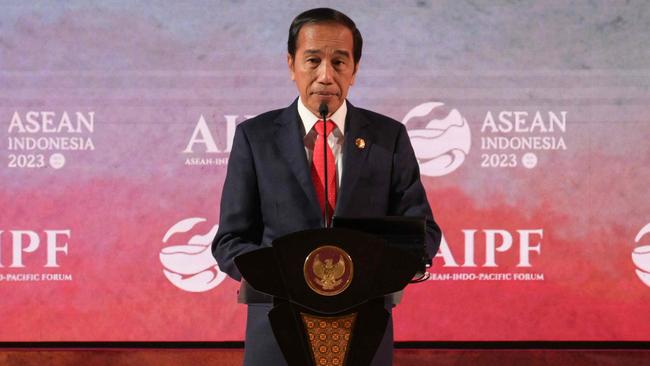Jokowi’s plea to ASEAN leaders: Don’t be used as proxy in power play
Indonesian President Joko Widodo has appealed to ASEAN member states not to succumb to ‘mutually destructive rivalry’.

Indonesian President Joko Widodo has appealed to ASEAN member states not to succumb to “mutually destructive rivalry” or allow the bloc to become a proxy for great powers as regional leaders gathered in Jakarta to discuss mounting crises in the neighbourhood.
This week’s ASEAN summit is the final series of meetings hosted by Indonesia before it hands the rotating chairmanship to Laos, an impoverished Southeast Asian client state that many fear could derail the bloc at a time of heightened tensions.
Ahead of his arrival late on Monday night Philippines President Ferdinand Marcos Jr said he would be “definitely pushing” for ASEAN to release a statement against Beijing‘s maritime bullying in the South China Sea, while Malaysia called for ”strong and effective measures” against the Myanmar junta.
On Tuesday, South Korean President Yoon Suk Yeol also called on Southeast Asian nations to “join forces” to respond to North Korea’s nuclear threats as Washington warned Pyongyang’s leader was set to make a rare trip to Russia for arms talks (see story P8).
Mr Yoon said North Korea’s missile launches “pose a direct and existential threat” not only to South Korea but also to its Southeast Asian allies.
“In times like these, the Republic of Korea and ASEAN must join forces to respond decisively and co-operate closely on North Korea’s denuclearisation,” Yoon said.
“ASEAN-ROK solidarity and co-operation must be enhanced further, so the rules-based international order will be able to take firm root in the Indo-Pacific region.”
A draft communique of the ASEAN summit seen by The Australian notes the recent surge of North Korean intercontinental ballistic missile launches as a “worrisome development” that threatened regional peace.
But the 10-member bloc – soon to become 11 with the imminent inclusion of East Timor – is split over how to respond to the raging civil conflict in Myanmar sparked by the February 2021 military coup and hamstrung by its economic reliance on China from calling out its intimidation of member states.
Jokowi, as the Indonesian leader is popularly known, urged all members on Tuesday not to lose sight of the need for ASEAN to work together “to create prosperity, stability, peace, to only for the region but the world”.
“We realise the world is not doing OK. Future challenges are getting tougher and resulting in a struggle for influence by big powers, but ASEAN has agreed not to be a proxy for any power, to co-operate with anyone for peace and prosperity,” he said.
“Don’t make our ship, ASEAN, an arena for mutually destructive rivalry.
“Even when navigating through storms, we, as ASEAN leaders, must ensure that this ship continues to sail forward. We must be the captains of our own ship.”
Critics have recently called out ASEAN for being “missing in action” over China’s use of water cannon against Philippines naval resupply ships and harassing Vietnamese fishing vessels – actions that have reignited tensions in the South China Sea.
ASEAN’s failure to make any headway on resolving the Myanmar crisis has also further tarnished its reputation, though on Tuesday evening Indonesian foreign minister Retno Marsudi revealed the bloc had agreed that Myanmar would not be allowed to take its turn as ASEAN chairman in 2026 as punishment for its failure to end the violence. Instead, the Philippines will step up that year.
Regional leaders will meet external partners on Wednesday, including separate talks with Chinese Premier Li Qiang and US Vice-President Kamala Harris, while an ASEAN-Australia meeting will be held on Thursday after the East Asia Summit.
Anthony Albanese was due to arrive on Tuesday night in Jakarta, where he will attend the summits and hold bilateral talks with Jokowi, Canadian Prime Minister Justin Trudeau and leaders from Malaysia, East Timor and Laos.
He will also unveil Australia’s new Southeast Asia economic strategy that he has described as the “most substantive piece of work ever done” on economic relations with the region.
Mr Albanese will fly to Manila late on Thursday for bilateral talks with President Marcos before heading to New Delhi for the G20 summit.
Additional reporting: AFP



To join the conversation, please log in. Don't have an account? Register
Join the conversation, you are commenting as Logout